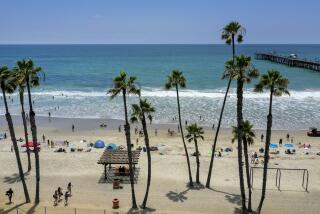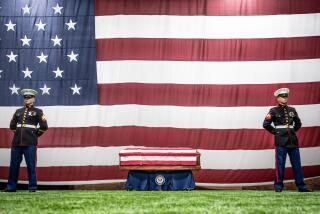Mosque Targeted in Fallouja Fighting
- Share via
FALLOUJA, Iraq — A fierce battle Monday in a rubble-strewn neighborhood of this Sunni Muslim stronghold left one Marine and at least eight insurgents dead, casting a new shadow over prospects for a peaceful solution to the military standoff here.
During the two-hour midday fight, in which at least eight U.S. troops were wounded, a Marine tank demolished the 150-foot-tall minaret of a mosque, from which machine-gun fire had been raining onto Marines 200 yards away.
At one point, the combatants exchanged rifle fire 30 yards apart.
The insurgents were close enough to hurl grenades on top of a building where Marines were briefly pinned down.
Farther back, on the roof of a U.S. military compound, Marine snipers cranked up the volume on their CD player so they could listen to the music of Metallica as they fired at their foes.
The fighting took place a day after U.S. officials said they had planned to begin joint neighborhood patrols in Fallouja this week with members of the Iraqi Civil Defense Corps. Since the Marines encircled the volatile city April 5, days after the killing and mutilation of four American civilian contractors here, the situation has seesawed between threats of a full-scale invasion and hopes for a peaceful settlement.
Though the U.S. believes it could destroy the insurgency here within days, officials have sought a negotiated solution to avoid civilian casualties that could carry a high political cost.
The situation is similar to that in the holy city of Najaf, where Shiite Muslim cleric Muqtada Sadr and his militia have taken control. The U.S. is worried that an assault there will result in heavy civilian casualties and damage to Islamic religious sites.
On Monday, U.S. officials warned Sadr’s fighters to remove their weapons from mosques, schools and other sites or face the consequences.
In Baghdad, two U.S. troops were killed and five were wounded by a powerful explosion that ripped through an industrial building they were searching for suspicious chemicals.
In Fallouja, a U.S.-set deadline for Iraqis to hand in heavy weapons is due to expire today. In recent days, as negotiators have declared short-term cease-fires, the Marines here have been engaged in almost daily skirmishes with insurgents.
So many Marines have been wounded that there is a backlog awaiting Purple Hearts.
Despite the intensity of Monday’s battle, it was unclear whether it would have any repercussions on efforts to reach a peaceful resolution. It also was not clear whether it would prevent the start-up of neighborhood patrols in parts of the city where there has been less fighting.
The fight began around 11:30 a.m. when Marines from Echo Company of the 2nd Battalion, 1st Regiment of the 1st Marine Division were attacked by 40 to 50 insurgents. The Camp Pendleton-based Marines had been searching a building in the Jolan neighborhood in the northwest corner of the city when they were fired upon.
Lt. Col. Gregg Olson, the battalion commander, said the fight was typical of a city battle: fought at close range, marked by extreme violence and involving massive amounts of ammunition.
The Marine patrol had ventured about 400 yards from the series of abandoned houses that serve as their headquarters.
The insurgents attacked with machine guns, rocket-propelled grenades, hand grenades and mortars.
The Marines responded by calling in Cobra helicopters firing Hellfire missiles.
“They fought like lions,” said Capt. Douglas Zembiec, commander of Echo Company. “They kept their cool; they evacuated their wounded. I get tears of pride when I think of them fighting like that.”
The minaret had been used repeatedly in recent weeks as a vantage point for insurgents to fire at Marines. But U.S. authorities have been wary of damaging or destroying Islamic holy sites in Fallouja and Najaf, fearing an adverse reaction from the Iraqi public.
Under rules set down by Marine generals, any preemptive strike on a mosque must be approved by Marine brass. But a decision to fire at a mosque during a battle is left with commanders on the scene, which is what happened Monday.
When Marines watched the tank destroy the minaret, several cheered.
Maj. Joseph Clearfield, the battalion’s operations officer, who helped direct the Marines’ fire, said later, “The Marines don’t want to have to destroy religious sites; there are certain things that are sacrosanct in war. But that mosque was key military terrain -- it dominated that portion of the city. As a show of faith, we had not occupied it, but they had continued to use it to fire upon us.
“We came here to start a soccer league. Instead, they are forcing us to topple mosques,” Clearfield continued. “I’m sure the people who built the mosque never figured it would be used by murderers and cowards as protection. It is consistent with an enemy that is without a redeeming quality.”
Navy corpsman Jackson Muchiri, 29, of Oak Harbor, Wash., said, “We were all happy when that thing came down.”
Most of the Marine injuries in the battle came from shrapnel. Several of those evacuated were rushed to a field hospital for surgery. Insurgents fired dozens of rocket-propelled grenades, lobbed hand grenades and fired automatic weapons from several directions. Some had been sighted before the battle gathering near the mosque.
“It was most intense,” said Pfc. John Sleight, 19, of Battle Creek, Mich. “In war you’ve got to expect the worst, but we didn’t expect something like this.”
The patrol’s foray to the building was the deepest move toward the center of the city that Echo Company has made. The building lies a few hundred yards from where the U.S. civilian contractors were killed weeks ago.
Lance Cpl. Robert Christmon, 20, who had injured his foot, said he would resist any effort to remove him from the front line because of his injury.
“I couldn’t live with myself if I left the guys,” he said.
In the final moments of the fight, the Marines returned to their compound and called for the helicopters to demolish the building they had been searching. An unknown number of insurgents had taken up positions there and were apparently killed or wounded by the missiles. In Baghdad, U.S. military officials reported that eight insurgents had been killed in the Fallouja fighting.
After the shooting stopped, a Marine convoy brought Protestant and Catholic chaplains to counsel the Marines and help them cope with the loss of a fellow Marine who was apparently killed by a grenade at the front of the battle. The troops described the fallen Marine as an easygoing man known for his concern for others.
“His death is giving life to this platoon. We are more committed than ever,” Navy Cmdr. Bill Devine, the lead chaplain of the 1st Marine Division, told Marines at a quickly arranged Catholic Mass.
One Marine sought out Devine for a tearful bear hug.
“He was right there, then he was gone,” he sobbed.
Some of the Marines moved to isolated spots amid the rubble of the camp so their peers could not see them crying. Some stared solemnly into the distance.
At the urging of Navy Lt. Scott Radetski, the Protestant chaplain, Marines lighted candles in honor of the dead and wounded.
A small cardboard memorial was quickly assembled and placed alongside memorials for two other Marines from Echo Company who were killed in a fight two weeks ago.
The cumulative stress of repeated battles showed on the faces of many of the Echo Company Marines.
Two Marines told the Protestant chaplain that they would like to be baptized.
“They say you plan for the worst and hope for the best, but we’ve been getting mostly the worst,” said Pfc. Tyler Hellmich, 20, of St. Louis. “You have to recognize one thing: War isn’t pretty.”
Zembiec, the Echo Company commander, said the battle proved to him that the idea of a truce is pointless.
“I think we need to go on the offensive,” he said. “The only thing that the insurgents understand is violence.”
More to Read
Sign up for Essential California
The most important California stories and recommendations in your inbox every morning.
You may occasionally receive promotional content from the Los Angeles Times.











